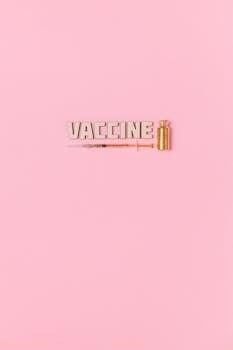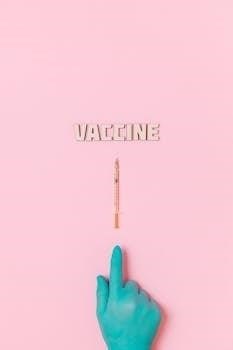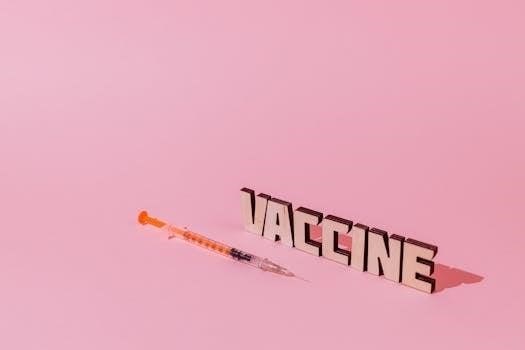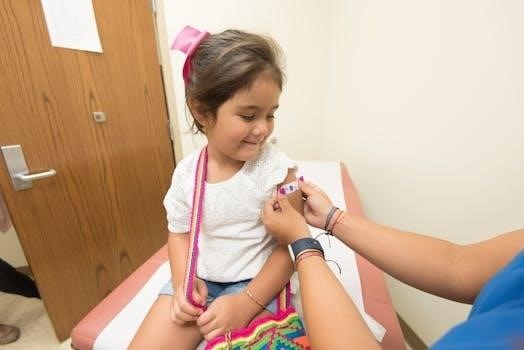Flu Vaccine Exemption Letter PDF NJ⁚ An Overview
The flu vaccine exemption letter in New Jersey provides a formal way to request exemption from mandatory flu vaccination policies. This is often done by submitting a PDF document outlining the reasons.

NJ Flu Vaccine Mandates⁚ Who is Required to be Vaccinated?
New Jersey mandates flu vaccines for specific groups, including children in daycare and preschool settings (up to 59 months). College students also have mandates, particularly for Meningococcal B vaccine, ensuring broad protection;
Daycare and Preschool Requirements (up to 59 months)
New Jersey stands out as one of the few states that mandates influenza vaccination for children attending licensed daycare centers and preschool facilities. This requirement applies to children between six months and 59 months of age, ensuring that young children receive at least one dose of the flu vaccine annually between September 1 and December 31.
This policy is designed to protect vulnerable young populations from the influenza virus. The goal is to minimize the spread of the flu within these close-knit environments. Parents should be aware of this requirement to maintain compliance with state regulations for childcare attendance.
College Student Requirements (Meningococcal B vaccine)
New Jersey uniquely mandates the Meningococcal B vaccine for all students enrolled in college classes, including online and commuter students. This requirement underscores the state’s commitment to preventing outbreaks of Meningococcal disease within college populations. Students must ensure compliance with this mandate to attend classes.
This requirement aims to protect students from the potentially severe consequences of Meningococcal B infection. New Jersey is the only state with such a broad mandate. College students should consult their healthcare providers. They should do so for vaccination information and exemption options. Vaccination records must be submitted for enrollment.
Types of Vaccine Exemptions in New Jersey
New Jersey offers medical and religious exemptions from mandatory vaccination requirements. These exemptions allow individuals to opt-out of vaccinations based on specific, qualifying circumstances.
Medical Exemptions
Medical exemptions in New Jersey are granted when a licensed physician determines that a flu vaccine poses a significant health risk to an individual. These exemptions are based on documented medical conditions or contraindications. Proper medical documentation is required, outlining why the vaccine is not suitable for the patient. This might include a history of severe allergic reactions to vaccine components or other specific health concerns. The physician must provide a written statement detailing the medical reason for the exemption.
These exemptions aim to protect individuals with genuine medical vulnerabilities. The documentation should be submitted following the guidelines established by the New Jersey Department of Health.
Religious Exemptions
Religious exemptions in New Jersey allow individuals to opt out of flu vaccinations based on sincerely held religious beliefs. To obtain a religious exemption, individuals must demonstrate that their objection to vaccination stems from a genuine religious conviction. This requires providing documentation that explains the religious basis for their opposition to vaccines.
The applicant may need to articulate how receiving a flu vaccine conflicts with their religious principles. The state reviews these requests to ensure the sincerity and consistency of the beliefs. Hackensack Meridian Health, for instance, honors past requests for religious exemptions.
This exemption acknowledges the importance of religious freedom.

How to Obtain a Religious Exemption in NJ
To obtain a religious exemption in New Jersey, one must demonstrate sincerely held religious beliefs that conflict with vaccination. Documentation explaining this conflict is typically required for submission.
Sincerity of Religious Beliefs
In New Jersey, claiming a religious exemption requires demonstrating the sincerity of one’s religious beliefs. This means the beliefs must be genuinely held and consistently followed, not merely a convenient objection to vaccination. The applicant may need to articulate how vaccination conflicts with their core religious tenets. Authorities might assess the consistency of these beliefs with the individual’s overall lifestyle and past actions. Substantiating the religious basis can involve providing documentation or statements from religious leaders. The key is proving that the opposition to vaccination stems from deeply rooted religious convictions, not personal preferences or secular concerns. Demonstrating this sincerity is crucial for the exemption approval.
Required Documentation
To obtain a religious exemption for flu vaccines in New Jersey, specific documentation is typically required. This often includes a notarized statement outlining the religious beliefs that conflict with vaccination. Some institutions may require a letter from a religious leader or spiritual advisor, affirming the individual’s adherence to those beliefs. The exemption request form, available from the New Jersey Department of Health or relevant institutions, must be completed accurately. Additional supporting documents, such as religious texts or personal declarations, can strengthen the application. Ensure all documents are legible and submitted within the specified deadlines. Failure to provide complete and accurate documentation may result in denial of the exemption request, emphasizing the importance of meticulous preparation.

NJ Department of Health and Vaccination Information
The New Jersey Department of Health offers resources on vaccination, testing, and treatment. They provide information for the public, schools, healthcare professionals, and businesses related to various health topics.
Accessing Official Information
To obtain accurate and up-to-date details regarding New Jersey’s flu vaccine mandates and exemption policies, consulting official sources is crucial. The New Jersey Department of Health’s website is the primary hub for accessing this information. Here, individuals can find detailed guidelines, regulations, and official statements pertaining to vaccine requirements and exemption procedures.
Official documents, downloadable forms, and frequently asked questions are typically available on the department’s website. This ensures that individuals have access to verified and reliable information when seeking exemptions, including medical or religious exemptions. Regularly checking the NJDOH website is recommended due to potential updates or changes in policies.
Resources for Public, Schools, and Healthcare Professionals
The New Jersey Department of Health provides tailored resources for various groups concerning flu vaccinations and exemptions. For the general public, informational materials cover vaccine recommendations and preventative measures against influenza. Schools can access guidelines on immunization requirements for students and procedures for managing exemptions, ensuring compliance with state regulations.
Healthcare professionals receive detailed guidance on vaccine administration, exemption protocols, and reporting requirements. These resources support informed decision-making and promote public health through effective communication and adherence to established policies. Accessing these resources ensures each group is well-equipped with the necessary knowledge to navigate flu vaccination and exemption processes effectively.
Flu Clinics in New Jersey
Flu clinics across New Jersey offer accessible vaccination services to the public, typically operating from September to December; These clinics help increase vaccination rates during flu season.
Princeton Health Department Flu Clinics
The Princeton Health Department provides flu clinics for both adults and children, usually from September to December, to assist with vaccination requirements. These clinics offer a convenient way for individuals to receive their annual flu shots. The state of New Jersey recognizes exemptions from required vaccinations, but understanding clinic availability is still important.
The Health Department aims to improve community health by making vaccines accessible. Residents can access information regarding clinic schedules and vaccine availability through the Princeton Health Department’s official channels. These clinics are vital in preventing the spread of influenza within the community, particularly among vulnerable populations. Keeping informed about these services is essential.
Availability and Timing (September to December)
Flu clinics in New Jersey, including those run by the Princeton Health Department, generally operate from September to December each year. This timing aligns with the peak flu season, aiming to provide vaccinations before the virus spreads widely. Availability during these months ensures that individuals can get vaccinated in time to develop immunity.
Parents and individuals seeking flu shots should check with their local health departments or healthcare providers for specific clinic schedules. The September-to-December timeframe is crucial for effective flu prevention. Staying informed about clinic dates and locations allows for timely vaccination, which helps protect against influenza during the high-risk period. Planning ahead is essential.
Impact of Flu Vaccine Exemptions on Staffing Shortages
Flu vaccine exemptions can potentially contribute to staffing shortages, particularly in healthcare settings. When a significant number of employees are exempt from mandatory flu vaccinations, it can increase the risk of influenza transmission within the workplace. This, in turn, could lead to more staff members becoming ill and unable to work, exacerbating existing staffing challenges.
The NJ flu vaccine exemption legislation should help mitigate potential staffing shortages, especially if coronavirus hospitalizations rise. Balancing employee rights to exemptions with the need to maintain adequate staffing levels is crucial. Healthcare facilities must carefully manage exemptions to ensure patient safety and workforce stability. This proactive approach is essential.

Current Flu Situation in New Jersey
New Jersey is currently experiencing rising cases of influenza, prompting health officials to encourage vaccination. The CDC recommends that everyone over six months of age receive the flu vaccine annually for protection.
Rising Cases of Influenza
New Jersey is observing an increase in influenza cases, raising concerns among health officials; The spike after the holiday season shows no sign of slowing down. This increase places added pressure on healthcare systems and underscores the importance of preventive measures, including vaccination. The rise in flu cases is also influencing discussions around flu vaccine exemptions, particularly in settings like daycare centers and schools. As the number of individuals seeking medical attention for flu-related symptoms increases, the debate over mandatory vaccination policies and exemptions intensifies. Understanding the current flu situation is crucial for informing decisions related to exemptions and public health strategies within the state.
CDC Recommendations for Vaccination
The Centers for Disease Control and Prevention (CDC) recommends that everyone over the age of 6 months receive an annual flu vaccine. This recommendation aims to reduce the spread of influenza and protect vulnerable populations. The CDC emphasizes that vaccination is the most effective way to prevent the flu and its complications. These recommendations are particularly relevant in New Jersey, where certain groups, like children in daycare, are mandated to receive the flu vaccine. Despite the CDC’s strong endorsement, individuals can seek exemptions based on medical or religious grounds. Understanding the CDC’s perspective is important when considering the implications of flu vaccine exemptions. The CDC also recommends other preventive measures to avoid close contact.
